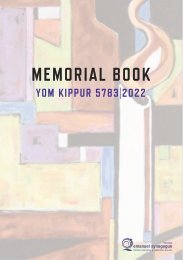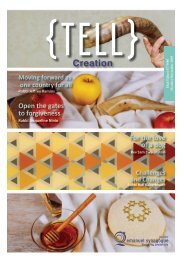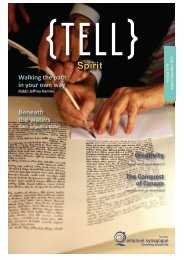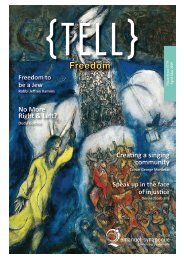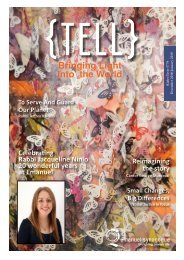TELL magazine: December 2020 - Emanuel Synagogue
The magazine of Emanuel Synagogue, Woollahra, Australia
The magazine of Emanuel Synagogue, Woollahra, Australia
You also want an ePaper? Increase the reach of your titles
YUMPU automatically turns print PDFs into web optimized ePapers that Google loves.
{THE POWER OF OBJECTS}
By Rabbi Jacqueline Ninio
Last night, I watched the Sydney commemoration for Jews from Arab Lands and
Iran. November 30th has been designated the date upon which we remember the
suffering and persecution of the Jews of these communities, and we also pause
to remember and celebrate the lives they led: the rich culture and traditions.
As part of the commemoration, there
was a virtual tour of the Sydney
Jewish Museum’s exhibition of
Jews from Arab Lands. As part of
the exhibition, we viewed artefacts
which had been rescued and brought
to Australia when families fled and
travelled across the seas; memories
and mementos of their lives. It was
so powerful to see these objects and
to remember and understand their
history and what they represented for
families: a wedding dress from Iran,
a Torah cover from India, a seder
plate from Egypt, all with distinctive
colours and patterns reflecting the
surrounding cultures in which they
were immersed.
Also in November, we commemorated
Kristallnacht. Then too, we
remembered and reflected on the
persecution of different communities
of Jews and again, we remembered
not only their suffering, but also the
full lives they led before the war. We
saw and reflected upon stories, many
told using and through objects. And
I began to think about objects: what
they mean and represent, how they
help us remember and their power in
our lives.
As we move now into Chanukah, the
festival of miracles, I want to share
with you a story of an object and a
miracle. This tale is told by Denny
Pinkus. Denny lives in Old Yaffa
in Israel and he runs a gallery. One
day a man came in wanting to sell
one rimon, the silver bell ornaments
from a Torah. The problem was, he
only had one of them, they come in
pairs. When Denny asked him why
he only had one, the man explained
that he was born in Germany. On
the evening of Kristallnacht all the
community, including his family,
had run to the synagogue to try and
save whatever they could. He said
that he ran in and a man standing
by the ark, handed him one of the
rimonim. He grabbed it and ran. The
Nazis destroyed the synagogue and
all that remained were the artefacts
that people were able to smuggle out
that night. He explained that he was
taken in by a Christian family and
he did not see his family again. They
moved to Romania and it was from
there he had recently made aliyah
and come to live in Israel. He was
now short of money and needed to
sell the rimon.
Denny listened to the story. He said
he has no idea what possessed him but
he bought the man’s rimon. It was of
absolutely no use to him, he could not
sell it without the pair, but something
compelled him to buy it that day. He
said that for years the rimon remained
in the gallery. Periodically it would be
polished, it moved from display case
to display case, never really finding a
home. He would look at it from time
to time and marvel at the intricate
work. Sometimes collectors would
show some interest but without the
matching one, they were not willing
to buy it.
One morning, many years after
the man had brought in the rimon,
a woman came in wanting to sell
some silver objects and Denny could
not believe his eyes when, there,
amongst the items she brought, was
the other rimon. He was sure that
it was the matching pair. He asked
the woman to tell him how she came
to have it. She explained that it was
Kristallnacht and they had all raced
to the synagogue to save whatever
they could. She was a child. She
looked in the ark and saw one rimon
sitting there so she grabbed it and
ran. At home she kept it with her
dolls. She was sent by her family to a
convent where she remained through
the war. Afterwards, her father found
her and they moved to Argentina
and then to Israel.
On a whim, Denny asked her if
she had a brother. She said that she
had a brother three years older but
they assumed he had died in the
concentration camps, they did not
hear anything about him after the
war. Denny and she both had tears
22



